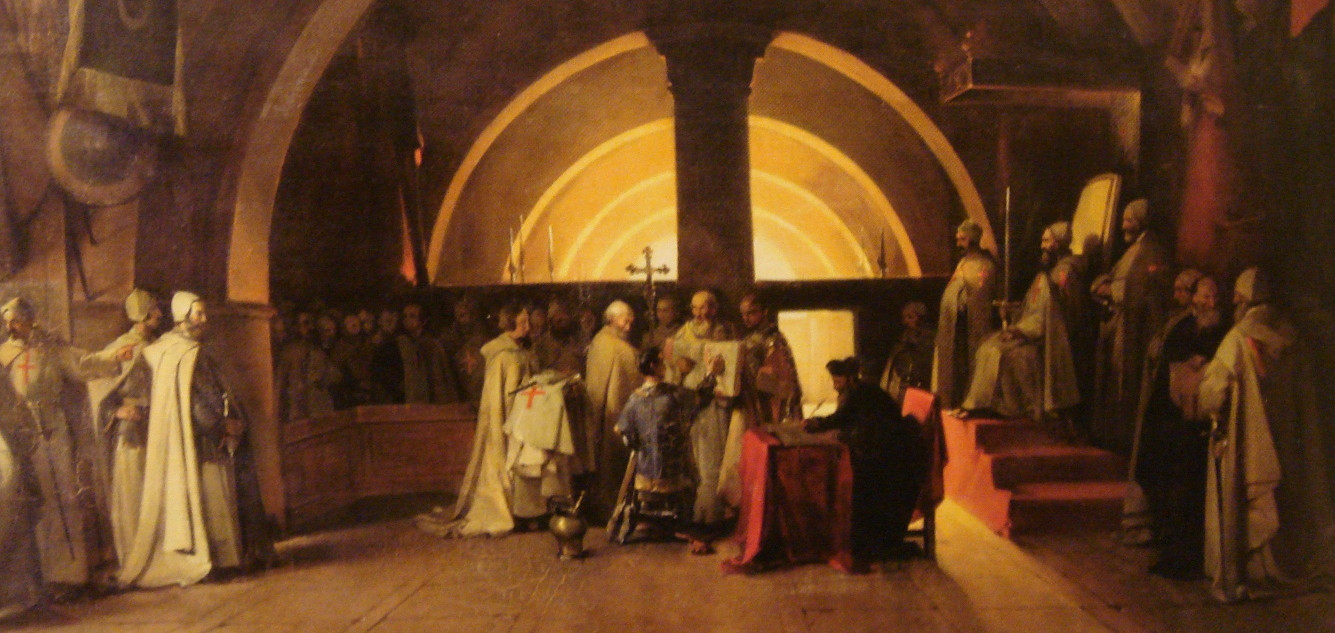
Jacques DeMolay, the namesake of the Order of DeMolay was born in, France in 1244. At 21, DeMolay joined the Order of Knights Templar.
The Knights Templar were founded in 1118, when nine nights took vows to protect Jerusalem and the Holy Lands, recently captured by the first crusade.
The Templars were ferocious warriors; pitching themselves into the midst of their enemies, astride charging war-horses, against incredible odds and quickly earned a name for valor and heroism. Sanctioned by the Catholic Church, and with many nobles and princes sending their sons to join the Knights Templar, the Order became very wealthy and popular throughout Europe.
The Order was said to possess 9000 estates and great wealth, which was deposited in its temples at Paris and London. Numerous princes and private individuals banked their personal property there, because of the uprightness and solid credit of such bankers. In Paris the Royal Family’s treasure was kept in the Temple.
Grand Master: In 1298, Jacques DeMolay was named Grand Master of the Knights Templar, a position of power and prestige. He was however in a difficult position. In the eyes of European monarchs and the Church, the Templar’s raison deter had ceased with the loss of the Holy Lands. Philip IV (the Fair) of France was deeply in debt to the Order, much like the European royalty who had seen their treasures stored in Paris. To prevent a rise in the power of the Church, and to increase his own wealth, Philip set out to take over the Knights.
Friday the 13th has long been considered an unlucky day. The origin is based on Friday morning, October 13, 1307. Philip and French Pope Clement V ruthlessly tried to suppress the Order throughout Europe with false accusations, arrests, torture, and executions. Because of the lack of evidence, the accused could be convicted only through their own confession. To extort this confession, the use of torture was considered necessary and legitimate.
Many of the accused declared themselves guilty of the secret crimes after being subjected to torture. The torture was so ferocious that many of them died during the torture.
While the Templars’ wealth and property were confiscated and given to Philip’s supporters in France, most of the rest of Europe found them innocent and left them to merge with other orders.
For seven years, DeMolay and the Knights suffered torture and inhumane conditions. DeMolay continued loyal and refused to betray his at-large comrades or disclose the location of the Templars’ funds.
On March 18, 1314, the Pope planned for DeMolay & his three first dignitaries to publicly confess their guilt and be reconciled to the Church. A platform was erected in front of the great Notre-Dame Cathedral to hear the confession.
Jacques DeMolay instead professed the innocence of the Templars and the falsity of his own alleged confessions. Another Knight, Guy of Aubergine, likewise disavowed his confession and stood with Jacques DeMolay.
King Philip ordered them both to be burned at the stake that day before the gates of the palace.
The brave deaths of DeMolay and Aubergine deeply impressed the people. The Pope and the King died shortly afterward. Legend spread that in the midst of the flames, DeMolay summoned them both to appear within the year before the tribunal of God.
Thus the story of Jacques DeMolay became a testimonial to loyalty and friendship.
